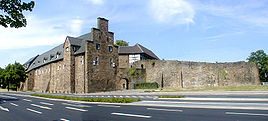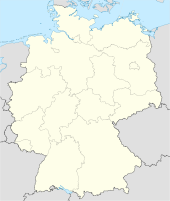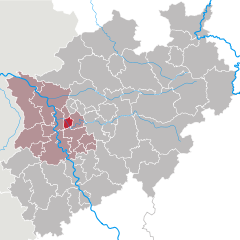- Mülheim
-
For other uses, see Mülheim (disambiguation).
Mülheim an der Ruhr Castle Broich in Mülheim 
Coordinates 51°26′N 6°53′E / 51.43333°N 6.88333°ECoordinates: 51°26′N 6°53′E / 51.43333°N 6.88333°E Administration Country Germany State North Rhine-Westphalia Admin. region Düsseldorf District Urban district City subdivisions 3 districts, 9 boroughs Lord Mayor Dagmar Mühlenfeld (SPD) Basic statistics Area 91.26 km2 (35.24 sq mi) Elevation 26-153 m Population 167,344 (31 December 2010)[1] - Density 1,834 /km2 (4,749 /sq mi) Other information Time zone CET/CEST (UTC+1/+2) Licence plate MH Postal codes 45468–45481 Area code 0208 Website www.muelheim-ruhr.de Mülheim an der Ruhr, also called "City on the River", is a city in North Rhine-Westphalia in Germany. It is located in the Ruhr Area between Duisburg, Essen, Oberhausen and Ratingen. It is home of many companies, especially in the food industry, such as the Aldi Süd Company or the Tengelmann Group.
Mülheim received its town charter in 1808, and 100 years later the population exceeded 100,000, making Mülheim officially a city. At the time of the city's 200th anniversary with approximately 170,000 residents, the city was counted among the smaller cities of Germany.
Mülheim was the first city in the Ruhr Area to become totally free of coal mines, when its last coal mine "Rosenblumendelle" was closed. The former leather and coal city had successfully made a complete transformation to a diversified economic centre. With more than 50% covered by greenery and forest, the city is regarded as an attractive place to live between Düsseldorf and the Ruhr. It is the home of two Max Planck Institutes and, since 2009, the technical college Ruhr West. It has a station on the important railway between Dortmund and Duisburg and is served by Rhine-Ruhr S-Bahn lines S1 and S3.
Contents
Geography
Geographical location
Mülheim an der Ruhr lies at the junction of the hill country of the Lower Bergisches Land, the western Hellweg and the plane of the middle Lower Rhine region.
The central city lies on both banks of the Ruhr river, about 12 km east of where the Ruhr's mouth opens onto the Rhine. The Ruhr traverses the whole city for a length of 14 km from south-east to north-west. With the district of Broich on its left bank and the Kirchenhügel (Church Hill) on its right bank – the gate of Mülheim – the Ruhr leaves the foothills of the Rhenish Massif and enters the Lower Rhine Plain. [2] The city's location right by the Ruhr is a characteristic of only Mülheim in the Ruhr region.
Geology
When looking at its geological structure, the city lies on the border region, known as the Marl border, of three regions – the Mittelgebirge of the Bergisches Land, the Lower Rhine Plain and the Westphalian Lowland. The areas lying northeast of the Ruhr, with their rich loess-containing soils, belong to the natural region known as West Hellweg. Whereas it's difficult to tell from the surface formations where the Westphalian Lowlands begin, the landscapes of the Bergisches Land and the Lower Rhine Plain are easily recognisable.
The northern foothills of the Rhenish Massif are characterised by the distinctive rock formation of the bare mountain slopes through which run coal-bearing layers which formed during the carboniferous period. Here the Ruhr cuts more than 50 meters deep into this Mittelgebirge. This natural erosion partly uncovered these mineable black coal deposits, which enabled their exploration and extraction using adits. However, the coal-rich layers became ever deeper as one progressed northward, which required setting up mines to extract the black coal. In contrast, the broad bayou (dead arm of a river) of Styrum borough is characteristic of the features of the Lower Rhine Plain.[3]
History
The town Mülheim was first mentioned in a document of the Werden Abbey in 1093. Later it belonged to the Duchy of Berg and became a free city in 1808. After the Congress of Vienna Mülheim was Prussian and from 1822 was a part of the Prussian Rhine Province. Mülheim became the centre of the Ruhr Uprising in 1920.
Boroughs
# Borough District Area [km²] Population Density [km²] 1 Altstadt I Rechtsruhr-Süd 3,20 19.741 6.169 2 Altstadt II Rechtsruhr-Süd 5,79 24.718 4.269 3 Styrum Rechtsruhr-Nord 4,44 15.605 3.515 4 Dümpten Rechtsruhr-Nord 5,51 19.031 3.454 5 Heißen Rechtsruhr-Süd 8,88 21.537 2.425 6 Menden-Holthausen Rechtsruhr-Süd 17,30 13.778 796 7 Saarn Linksruhr 26,92 23.878 887 8 Broich Linksruhr 8,78 13.941 1.588 9 Speldorf Linksruhr 10,46 18.183 1.738 International relations
Main article: List of twin towns and sister cities in GermanyMülheim is twinned with:
 Darlington, United Kingdom, since 1953
Darlington, United Kingdom, since 1953 Tours, France, since 1962
Tours, France, since 1962 Kuusankoski, Finland, from 1972 to 2008
Kuusankoski, Finland, from 1972 to 2008 Opole, Poland, since 1989 [4]
Opole, Poland, since 1989 [4] Kfar Sava, Israel, since 1993
Kfar Sava, Israel, since 1993 Istanbul-Beykoz, Turkey, since 2007
Istanbul-Beykoz, Turkey, since 2007 Kouvola, Finland, since 2009
Kouvola, Finland, since 2009 Qalqilyah, Palestine, friendship
Qalqilyah, Palestine, friendship
Notable bands
- Bohren & der Club of Gore (founded 1992), a jazz & ambient band
- Die Lokalmatadore (founded 1982), a punk band
Notable clubs
- 1. FC Mülheim (founded 1923), a football club
- VfB Speldorf (founded 1919), a football club
Notable companies
- Plus (founded 1972), a supermarket chain
- Tengelmann (founded 1867), a holding company
Notable institutes
Notable people
- Wilhelm Rittenhausen (born 1644), founder of the first paper mill in North America.
- Gerhard Tersteegen (born 1697), a Reformed religious writer.
- Carl Arnold Kortum (born 1745), a physician, best known for his writing and poetry.
- August Bungert (born 1845), an opera composer and poet.
- Hugo Stinnes (born 1870), an industrialist and founder of the German People's Party.
- Fritz Thyssen (born 1873), an industrialist associated with the Nazi Party of Adolf Hitler.
- Heinrich Thyssen (born 1875), a German-Hungarian entrepreneur and art collector.
- Arthur Kaufmann (born 1888), an influential painter.
- Walter Hartmann (born 1891), a general of Artillery, serving during World War II.
- Otto Pankok (born 1893), a painter, printmaker, and sculptor.
- Otto Roelen (born 1897), a chemist.
- Karl Ziegler (born 1898), a chemist who won the Nobel Prize in Chemistry in 1963, with Giulio Natta, for work on polymers.
- Clärenore Stinnes (born 1901), a car racer; who was the first human to circumnavigate the world by automobile.
- Werner Best (born 1903), a jurist, police chief, and Nazi leader.
- Fritz Buchloh (born 1909), a football goalkeeper at two World Cups in 1934 and 1938, who played for VfB Speldorf.
- Günther Smend (born 1912), an officer and a resistance fighter involved in the July 20 Plot to assassinate Adolf Hitler.
- Johannes Bölter (born 1915), a Heer tank commander during World War II.
- Karl Albrecht (born 1920), an entrepreneur who founded the discount supermarket chain Aldi with his brother Theo and among the richest men in the world.
- Theo Albrecht (born 1922), an entrepreneur who was ranked as the 20th richest person in the world by Forbes magazine in 2007.
- Wilhelm Knabe (born 1923), an ecologist, pacifist, civil servant, politician and a co-founder of the Green Party in Germany.
- Wim Thoelke (born 1927), a TV entertainer.
- Jürgen Sundermann (born 1940), a manager and former footballer.
- Hans Walitza (born 1945), a retired football striker and manager.
- Rudolf Seliger (born 1951), a former football striker, who played for MSV Duisburg.
- Bodo Hombach (born 1952), a politician and Member of the SPD.
- Monika Griefahn (born 1954), a politician of the SPD.
- Hans-Günter Bruns (born 1954), a retired footballer.
- Helge Schneider (born 1955), a comedian, jazz musician, author, film and theatre director, and actor.
- Ralph Morgenstern (born 1956), a television presenter and actor.
- Hannelore Kraft (born 1961), a politician (SPD) and Minister-President of North Rhine-Westphalia.
- Ralf Lübke (born 1965), a retired athlete who specialized in the 200 metres.
- Willi Landgraf (born 1968), a soccer player, currently playing for the amateurs of Schalke 04.
- Sven Meinhardt (born 1971), a field hockey forward, who won the gold medal at the 1992 Summer Olympics.
- Kai Gehring (born 1977), a politician.
- André Lenz (born 1973), a football goalkeeper.
- Lars Burgsmüller (born 1975), a tennis player.
- Marion Rodewald (born 1976), a field hockey defender, who won the gold medal at the 2004 Summer Olympics.
- Felix Erdmann (born 1978), a rowing cox.
- Simone Hanselmann (born 1979), an actress.
- Salih Altın (born 1987), a football player.
See also
References
- ^ "Amtliche Bevölkerungszahlen" (in German). Landesbetrieb Information und Technik NRW. 31 December 2010. http://www.it.nrw.de/statistik/a/daten/amtlichebevoelkerungszahlen/index.html.
- ^ "Mülheim an der Ruhr official website – The new Mülheim".


 (in English, German and French) © 1998–2010 MST Mülheimer Stadtmarketing und Tourismus GmbH. http://www.muelheim-ruhr.de/cms/the_new_muelheim1.html. Retrieved 2010-02-12.
(in English, German and French) © 1998–2010 MST Mülheimer Stadtmarketing und Tourismus GmbH. http://www.muelheim-ruhr.de/cms/the_new_muelheim1.html. Retrieved 2010-02-12. - ^ "Mülheim an der Ruhr official website – Eine kurze Geschichte zur Geologie und zur Geographie des Stadtgebietes".
 (in only German) © 1998–2010 MST Mülheimer Stadtmarketing und Tourismus GmbH. http://www.muelheim-ruhr.de/cms/muelheim_im_wandel_dererdgeschichte.html. Retrieved 2010-04-19.
(in only German) © 1998–2010 MST Mülheimer Stadtmarketing und Tourismus GmbH. http://www.muelheim-ruhr.de/cms/muelheim_im_wandel_dererdgeschichte.html. Retrieved 2010-04-19. - ^ "Opole Official Website – Twin Towns".

 (in English and Polish) © 2007–2009 Urząd Miasta Opola. http://www.opole.pl/miasto/index.php?option=com_content&task=blogcategory&id=20&Itemid=108. Retrieved 2009-06-18.
(in English and Polish) © 2007–2009 Urząd Miasta Opola. http://www.opole.pl/miasto/index.php?option=com_content&task=blogcategory&id=20&Itemid=108. Retrieved 2009-06-18.
External links
- Official website (English) (German) (French)
Cities in Germany by population 1,000,000+ 500,000+ 200,000+ Aachen · Augsburg · Bielefeld · Bochum · Bonn · Braunschweig · Chemnitz · Duisburg · Erfurt · Freiburg im Breisgau · Gelsenkirchen · Halle an der Saale · Karlsruhe · Kiel · Krefeld · Lübeck · Magdeburg · Mannheim · Münster · Mönchengladbach · Oberhausen · Rostock · Wiesbaden · Wuppertal
100,000+ Bergisch Gladbach · Bottrop · Bremerhaven · Cottbus · Darmstadt · Erlangen · Fürth · Göttingen · Hagen · Hamm · Heidelberg · Heilbronn · Herne · Hildesheim · Ingolstadt · Jena · Kassel · Koblenz · Leverkusen · Ludwigshafen · Mainz · Moers · Mülheim an der Ruhr · Neuss · Offenbach am Main · Oldenburg · Osnabrück · Paderborn · Pforzheim · Potsdam · Recklinghausen · Regensburg · Remscheid · Reutlingen · Saarbrücken · Salzgitter · Siegen · Solingen · Trier · Ulm · Wolfsburg · Würzburg
 Urban and rural districts in the state of North Rhine-Westphalia in Germany
Urban and rural districts in the state of North Rhine-Westphalia in Germany 
Urban districts Bielefeld · Bochum · Bonn · Bottrop · Dortmund · Duisburg · Düsseldorf · Essen · Gelsenkirchen · Hagen · Hamm · Herne · Köln (Cologne) · Krefeld · Leverkusen · Mönchengladbach · Mülheim · Münster · Oberhausen · Remscheid · Solingen · Wuppertal
Rural districts Aachen · Borken · Coesfeld · Düren · Ennepe-Ruhr-Kreis · Euskirchen · Gütersloh · Heinsberg · Herford · Hochsauerlandkreis · Höxter · Kleve (Cleves) · Lippe · Märkischer Kreis · Mettmann · Minden-Lübbecke · Oberbergischer Kreis · Olpe · Paderborn · Recklinghausen · Rheinisch-Bergischer Kreis · Rhein-Erft-Kreis · Rhein-Kreis Neuss · Rhein-Sieg-Kreis · Siegen-Wittgenstein · Soest · Steinfurt · Unna · Viersen · Warendorf · Wesel
Categories:- Geography articles needing translation from German Wikipedia
- Cities in North Rhine-Westphalia
- Mülheim
Wikimedia Foundation. 2010.




